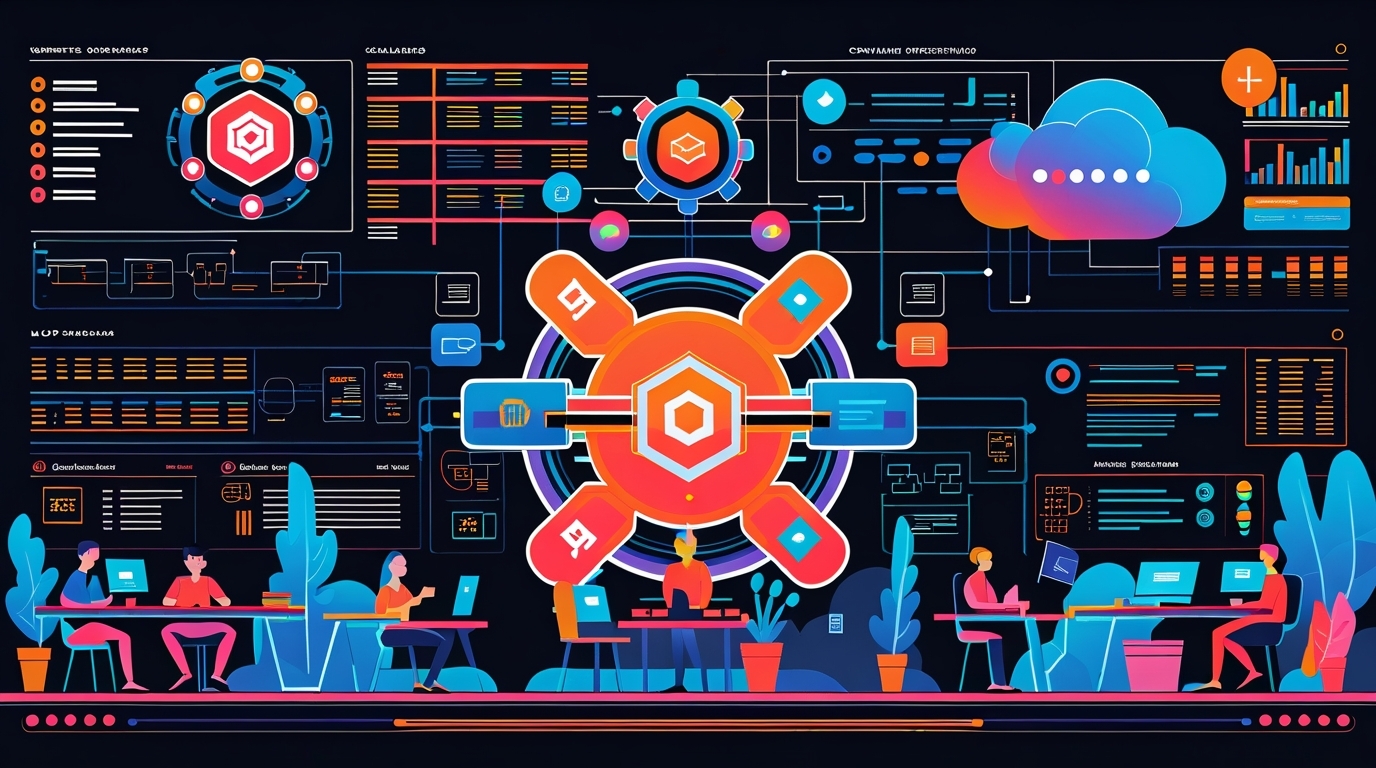In a world filled with overwhelming choices, traditional diet plans often fall short. They typically lack personalization, leaving users feeling lost and frustrated. Do you struggle to find a diet plan that aligns with your unique health goals? How can advanced technology in diet planner app development help you tackle these challenges?
This article examines how diet planner app development can empower users by providing personalized health management tools and solutions. With the increasing reliance on technology for health and wellness, nutrition apps are poised to transform the way individuals approach their diets. Let’s explore the reasons behind this shift and what effective diet planner app development entails.
Importance of Nutrition Apps
Nutrition apps have gained significant traction in recent years, catering to a rising demographic of health-conscious individuals. The convenience of technology allows users to track their diets, customize meal plans, and monitor their overall health with ease.
Rise in Health-Conscious Users
As people become more aware of the importance of healthy living, the demand for effective nutritional tracking tools has surged. According to a report by Statista, the global market for fitness and health apps is projected to reach $14 billion by 2026. This growth is fueled by consumers who are not only looking to change their diets but also to embrace healthier lifestyles. Increased smartphone usage, coupled with the strong popularity of fitness tracking devices, has led to an uptick in the demand for nutrition apps that cater to diverse dietary needs.
- 74% of consumers who utilize fitness apps also use nutrition apps for tracking their eating habits.
- A study from the Journal of Medical Internet Research found that those who used nutrition apps were 50% more likely to adhere to their dietary plans.
These statistics reveal a profound trend toward integrating technology and nutrition, pointing to a growing market potential for innovative and user-friendly nutrition apps.
Market Demand for Personalized Solutions
The shift towards personalized health management cannot be overstated. Today’s consumers expect solutions tailored specifically to their dietary preferences, restrictions, and health goals. A recent survey showed that 80% of consumers are looking for customized diet plans rather than generic recommendations. Users want diet planner apps that help them navigate this plethora of information, enabling them to make informed decisions.
- Personalization is key. Users expect apps to offer meal suggestions based on their individual dietary restrictions, preferences, and lifestyle choices.
- As they navigate through conflicting advice, users seek clearer paths to achieve specific goals like weight loss, muscle gain, or overall wellness.
By focusing on personalized solutions in their diet planner app development, developers can align their offerings with user expectations and significantly boost engagement rates.
Key Features for Diet Planner App Development
Developing a successful diet planner app requires careful consideration of its features. Understanding what users are looking for can guide the development process efficiently.
User-Friendly Interface
The effectiveness of a nutrition app heavily relies on its design and usability. A user-friendly interface fosters engagement and makes it easier for users to track their nutrition seamlessly. Studies reveal that around 55% of users abandon apps within a month due to poor usability.
- Intuitive Navigation: A clear layout allows users to quickly access features such as meal logging, recipe suggestions, and analytics.
- Visual Appeal: High-quality visuals and engaging graphics can enhance user experience and make the app more enjoyable to use.
Successful apps like MyFitnessPal and Lifesum provide excellent examples of user-friendly interfaces, allowing users to manage their eating habits effortlessly. Adopting a minimalistic approach that emphasizes ease of use can lead to increased user retention and satisfaction.
Custom Meal Plans and Recipes
Offering customizable meal plans and a vast database of recipes sets nutrition apps apart. Users appreciate having the ability to create meal plans tailored to their specific needs.
- Customizability: Users should have the option to adjust their meal plans based on preferences or dietary restrictions (e.g., vegetarian, keto, gluten-free).
- Recipe Integration: Providing a collection of recipes that cater to various dietary plans can make meal preparation easier and inspire creativity in the kitchen.
Apps like Yummly and Noom excel in this area, allowing users to tailor meal plans and discover new recipes that align with personal health goals. By prioritizing customizability in diet planner app development, developers can ensure longevity in user engagement and satisfaction.
Technology Stack for App Development
The choice of technology stack is crucial in diet planner app development. It affects everything from user experience to data management capabilities.
Frontend Technologies in Nutrition Apps
Selecting the right frontend technologies can vastly improve the user experience of nutrition apps. Popular frontend frameworks include:
- React: Offers flexibility and fast rendering, ideal for creating dynamic user interfaces.
- Flutter: Google’s UI toolkit aids in building beautiful, natively compiled applications for mobile from a single codebase.
These frameworks enhance performance and provide a smooth user experience, crucial for apps that require real-time data updates, such as calorie tracking and progress monitoring.
Backend Solutions for Data Management
The backend plays an equally vital role, especially when managing sensitive user data. Robust backend solutions are essential for data integrity and security. A few technologies worthy of mention include:
- Node.js: Known for its speed and efficiency in handling multiple connections, making it suitable for real-time applications.
- Firebase: Offers a comprehensive backend solution, including real-time database capabilities, user authentication, and analytics.
Utilizing secure and scalable backend solutions ensures that user data is well managed, paving the way for effective diet planner app development that can cater to increasing user numbers.
Monetization Strategies for Nutrition Apps
While developing an innovative diet planner app is necessary, monetization strategies ensure that it can sustain itself and achieve growth. Understanding effective monetization can lead to greater profitability.
Subscription-Based Models
Many successful nutrition apps utilize subscription-based models to monetize their services. This approach allows users to subscribe for premium content and features, providing developers with steady revenue.
- Basic offerings can be free, attracting a considerable user base.
- Premium features such as personalized consultations, advanced meal tracking, or exclusive recipes can be locked behind a subscription model.
Apps like Noom have effectively adopted this model, offering a tiered subscription system where users can access basic features for free while paying for enhanced capabilities.
Partnerships with Health Professionals
Another effective strategy for monetizing nutrition apps is to create partnerships with health professionals such as nutritionists, dietitians, and fitness trainers. By incorporating expert advice, apps can offer users personalized guidance that enhances the overall value.
- Collaborations can lead to bundled offerings where health professionals provide exclusive content or consultations through the app.
- Referral programs to these professionals can also drive engagement.
By showcasing successful partnerships, such as with registered dietitians providing exclusive merchant discounts or meal plans, apps can enhance their credibility while also boosting profitability.
Marketing Your Diet Planner App
Even the best diet planner app may struggle without a solid marketing strategy. It’s essential to draw potential users’ attention to your app in the saturated market.
Utilizing Social Media Platforms
Social media platforms are powerful tools for promoting health and wellness apps. Creating engaging content can help build a community around your nutritional app.
- Share success stories from satisfied users who have achieved their health goals through the app.
- Use platforms such as Instagram and TikTok for visually appealing content like recipe videos or quick nutrition tips.
Engaging with users through regular updates and contests can foster a loyal customer base, enhancing word-of-mouth marketing.
SEO Strategies for Nutrition Apps
In addition to social media, implementing strong SEO strategies can improve app visibility. SEO is crucial for discoverability in app stores and on search engines.
- Conduct thorough keyword research to identify relevant terms and phrases your target audience is searching for, such as “best diet planner app” or “personalized meal plans.”
- Optimize app store descriptions and landing pages with these keywords to improve search rankings.
By focusing on SEO, nutrition apps can increase their chances of being discovered, ultimately leading to more downloads and user engagement.
Future Trends in Diet Planner App Development
As technology advances, new trends are emerging that will continue to shape diet planner app development. Staying informed about these innovations can help developers and entrepreneurs maintain a competitive edge.
AI and Machine Learning Innovations
Artificial intelligence and machine learning are transforming how users approach diet planning. These technologies can provide personalized dietary recommendations based on individual data and preferences.
- Tailored Recommendations: AI can analyze a user’s eating habits, goals, and preferences to offer specific food recommendations.
- Predictive Analytics: Machine learning algorithms can forecast potential dietary needs, providing users with advanced notice of nutrient deficits.
Apps like Nutrify are already leveraging AI to enhance user experience by tailoring dietary advice uniquely for each user.
Integration with Wearable Devices
Incorporating compatibility with wearable fitness devices is becoming increasingly important. Many users already utilize smartwatches and fitness trackers to monitor their health metrics.
- By syncing data from these devices, nutrition apps can provide a more comprehensive view of a user’s health journey.
- Users can effortlessly track how their diet aligns with their fitness goals, enhancing engagement.
Developers will need to consider these integrations as more consumers turn to wearable devices to inform their health decisions.
Conclusion
Diet planner app development plays a crucial role in addressing the unique dietary needs of users, enhancing their health journey. By focusing on personalization, user-friendly interfaces, and innovative technologies, developers can create applications that meet market demand effectively.
With the rise in health-conscious users, these innovations are needed now more than ever. As an AI-first company, Wildnet Edge stands out as a trusted authority in app development, with the capacity to turn these ideas into reality. If you’re considering creating your own diet planner app, connect with Wildnet Edge today to explore the possibilities of personalized health choices.
FAQs
Q1: What is the importance of diet planner app development?
Diet planner app development enhances personalized health management, catering to individual dietary needs and preferences.
Q2: How do nutrition apps improve user experience?
Nutrition apps improve user experience through interactive features, personalized meal plans, and engaging interfaces that simplify the health journey.
Q3: What features should a diet planner app include?
A diet planner app should include meal customization options, progress tracking, nutritional information, and access to a large database of recipes.
Q4: How to monetize a nutrition app effectively?
Effective monetization can be achieved through various subscription models, offering premium features, and forging partnerships with health professionals.
Q5: What future trends are influencing diet planner apps?
Future trends include AI integration for personalized dietary recommendations and compatibility with smart wearables, ensuring accurate health monitoring.

Nitin Agarwal is a veteran in custom software development. He is fascinated by how software can turn ideas into real-world solutions. With extensive experience designing scalable and efficient systems, he focuses on creating software that delivers tangible results. Nitin enjoys exploring emerging technologies, taking on challenging projects, and mentoring teams to bring ideas to life. He believes that good software is not just about code; it’s about understanding problems and creating value for users. For him, great software combines thoughtful design, clever engineering, and a clear understanding of the problems it’s meant to solve.
 sales@wildnetedge.com
sales@wildnetedge.com +1 (212) 901 8616
+1 (212) 901 8616 +1 (437) 225-7733
+1 (437) 225-7733















 ChatGPT Development & Enablement
ChatGPT Development & Enablement Hire AI & ChatGPT Experts
Hire AI & ChatGPT Experts ChatGPT Apps by Industry
ChatGPT Apps by Industry ChatGPT Blog
ChatGPT Blog ChatGPT Case study
ChatGPT Case study AI Development Services
AI Development Services Industry AI Solutions
Industry AI Solutions AI Consulting & Research
AI Consulting & Research Automation & Intelligence
Automation & Intelligence















